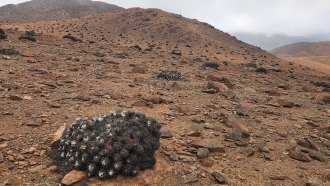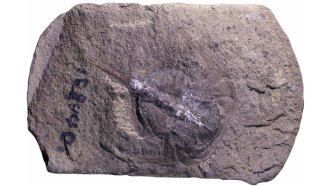Rebecca Dzombak
Rebecca Dzombak is a science writer covering the natural world and humans' role in it, past, present and future. She holds a Ph.D. in Earth and Environmental Sciences.

Trustworthy journalism comes at a price.
Scientists and journalists share a core belief in questioning, observing and verifying to reach the truth. Science News reports on crucial research and discovery across science disciplines. We need your financial support to make it happen – every contribution makes a difference.
All Stories by Rebecca Dzombak
-
 Plants
PlantsMeet a scientist tracking cactus poaching in the Atacama Desert
Botanist Pablo Guerrero has been visiting Atacama cacti all his life. They’re not adapting well to a drier climate, booming mining and plant collection.
-
 Life
LifeTrees are failing to adapt to climate change. Losing fungi partners may be why
Certain fungi give trees nutrients and water, but heat and drought are putting both at risk.
-
 Animals
AnimalsHow a new Lyme vaccine for mice may protect people
A vaccine, distributed as pellets, can neutralize Lyme-causing bacteria in wildlife. Scientists hope it will reduce Lyme exposure for people and pets.
-
 Life
LifeCapybaras thrive, even near humans, because they’re not picky eaters
Scientists didn’t expect capybaras to eat both grasses and forest plants. The rodents’ flexible diet helps them live everywhere from cities to swamps.
-
 Science & Society
Science & SocietyRussia’s invasion could cause long-term harm to Ukraine’s prized soil
War will physically and chemically damage Ukraine’s prized, highly fertile chernozem soils. The impacts on agriculture could last for years.
-
 Environment
EnvironmentCorals may store a surprising amount of microplastics in their skeletons
In tropical waters, coral reefs may be a “sink” for tiny bits of plastic debris. It’s unclear how corals’ trash pickup might affect reef health.
-
 Animals
AnimalsFlamingos dye their sun-faded feathers to stay pretty in pink
During mating season, flamingos rub a makeup-like rouge on their necks to catch the eye of the opposite sex. They don’t bother once chicks are born.
-
 Paleontology
PaleontologyHow fossilization preserved a 310-million-year-old horseshoe crab’s brain
A 310-million-year-old horseshoe crab’s brain was preserved in clay, thanks to an uncommon fossilization process that protected the fragile neural tissues.